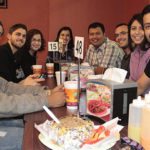Posted: 2/01/08
Panelists, participants
explore interfaith relationships
By John Pierce
Baptists Today
ATLANTA—Three Baptist leaders known for building ecumenical and interfaith relationships faced the issue of how to relate to persons of other faiths while holding to their own Christian convictions.
One panelist, pastor Gerald Durley of Providence Missionary Baptist Church in Atlanta, referenced a “Peanuts” comic strip in which the character Sally brags about convincing a boy in her class to agree with her religious convictions—after she hit him with her lunchbox.
“We’ve got to quit beating up on people with our religious lunchboxes and bringing condemnation down on one another,” said Durley.
He told of a mutually beneficial relationship between his congregation and an Atlanta synagogue as well as personal participation in international travel with interfaith clergy.
| • See latest photos and the latest video clips from the New Baptist Covenant Meeting. (And go here to see our complete coverage of the event). |
Panelist David Currie, executive director of Texas Baptists Committed, confessed to encountering little religious pluralism while growing up in Paint Rock, Texas.
“There were no Muslims, Jews or Buddhists,” said Currie. “It was a fairly non-challenging place to grow up religiously.”
However, Currie, a board member of the Washington, D.C.-based Interfaith Alliance, said he believes relationship-building across faith traditions strengthens the protections of religious liberty.
“I’m involved in interfaith work because I believe we need the freedom to tell people about Jesus,” said Currie.
Currie said some Christians don’t understand the difference between acceptance of a person and approval of their religious beliefs and behaviors.
“I accept all kind of people I don’t approve of,” said Currie. “And I hope people accept me even though they don’t approve of everything I do.”
Baptist World Alliance General Secretary Neville Callam, the third panelist, affirmed that many complexities arise from interfaith endeavors.
“It is a very difficult subject because it touches a nerve in people’s deepest convictions,” said Callam, a Jamaican Baptist.
Callam said the overriding question is how people of diverse faith can cohabitate the earth.
“It is God’s will for Christians to relate to all creation—each and every human—in loving ways,” he urged. “Christians have an obligation of neighbor love.”
The discussion period focused on practical applications such as participation in interfaith weddings and community services.
Durley said his participation in interfaith services after the 911 and Katrina tragedies “did not demean” his own faith as a Christian.
In response to a question about the perspective that Jesus is the only way to salvation, the panelists said it was possible, even preferable, to hold to one’s convictions and share Christ with others while refraining from being hostile or judgmental.
Currie said he was “pretty conservative” is his belief that Jesus is the way to God but didn’t feel the need to tell friends of other faiths, “You’re going to hell.”
“I don’t think God sent me to give that news,” he said.
Durley challenged the notion that interfaith efforts lead to nothing more than good feelings for those involved.
“It’s not about feeling good,” said Durley. “It’s about doing my Master’s will and being a light on hill.”
When traveling abroad with Muslim, Jewish and Christian leaders, Durley said he finds some observers surprised that the diverse American clergy are friends.
“People in Antioch asked, ‘What’s this—people of different faiths on the same bus?’”
Callam asked and answered his own question. “Can we get along? We can and we must.”
Joe Lewis, pastor of Second Baptist Church in Petersburg, Va., moderated the “Finding Common Ground with Other Faiths” discussion.














We seek to connect God’s story and God’s people around the world. To learn more about God’s story, click here.
Send comments and feedback to Eric Black, our editor. For comments to be published, please specify “letter to the editor.” Maximum length for publication is 300 words.